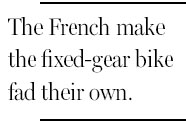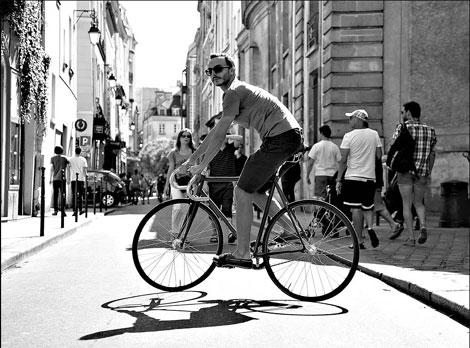Two-wheeled American in Paris
Updated: 2011-10-09 07:58
By Scott Sayare(The New York Times)
|
|||||||
|
Finicky, fixed-gear bikes, which cannot coast, are catching on in Paris, largely because of their sleek appearance. Valerio Mezzanotti for The New York Times |
PARIS - For years, they have been the showy accessories of the fashion-forward, urban 20-or-30-something set - hipsters, that is - from Brooklyn to San Francisco. They have long been fetishized, too, in Tokyo and London.
It has taken more time for the elegant fixed-gear bicycle to catch on in Paris, but the style is now decidedly in vogue.
Suddenly, fixies - the finicky one-speed bikes that, without freewheels, cannot coast - seem to be everywhere: on the cobblestones of the Marais, the boulevards of the Latin Quarter, the north slope of Montmartre. They are in display windows, at fashion shoots, in women's lifestyle magazines. Aficionados of the "pignon fixe" organize races and bike polo matches and group rides around Paris.
As one might expect, many fixie proprietors here are design students and electronica kids, but there are also well-heeled young executives, adventuresome retirees and pleasant men and women of all sorts. There are new fixies and old fixies, modest home-built fixies and fluorescent factory fixies, and fixies tossed and spun alongside the skateboarders behind the Palais de Tokyo.
In contrast with the hipper-than-thou attitude often associated with the bikes' American acolytes, fixie riders can be said to have a convivial scene in Paris, where the bikes are as much activity as social marker. Despite the haughtiness for which this city is renowned, the community that has developed around them is uncommonly inclusive.
"There isn't that element of snobbishness," said Bruno Zuzze, 33, the founder of Surplace, a fixie club that organizes frequent group rides. Fixie owners often salute one another on the street, "like motorcyclists, back in the day," he said.
Pignonfixe.com, a Web forum begun in 2007 and widely viewed as the nexus of French fixie-dom, sees almost 50,000 unique visitors and two million page views each month.

Like Mr. Zuzze, many in Paris's fixed-gear vanguard say they first saw the bikes on visits to Manhattan (the city's messengers have sped around on them for decades) before returning, covetous, to France.
As much design objects as means of transport, the sleek bikes do seem particularly appropriate to Paris and the sensibilities of the aesthetes who make up so much of the city's population. And bicycles, in general, have exploded in popularity here since the 2007 launch of the Velib' bike-sharing program, bike-shop owners say.
"You take a seat on the Canal St.-Martin to have a morning coffee, and all you see are bikes going by," said Alexandre Billard, who in 2007 opened biCyCle Store Paris, a spare and meticulously curated boutique in the Third Arrondissement.
One of several new specialty shops selling mostly fixies and fixie components, Mr. Billard's store on a recent afternoon displayed cranks of at least 10 colors, along with a selection of messenger bags and Brooks England leather saddles.
In May, the store started its own brand of custom-fitted fixies, handmade in Columbus Niobium steel by a French frame-maker, Daniel Hanart - base price: 2,500 euros for the frame alone. France used to count a great number of artisan frame-builders, Mr. Billard said, most lost in the past four decades to the rise of Asian mass-production.
But this being the land of "terroir," provenance is a point of pride. Many fixed-gear fans here have taken to building up bikes with old artisanal French frames, said Thomas Courvalin, 34, the unassuming lawyer who founded pignonfixe.com.
The fixed-gear fad here involves a distinctive nostalgia, Mr. Courvalin said, a yearning for an era of French "insouciance."
France has a deep cycling heritage, he said, and fixies are proving a "gateway" to rediscovering that history.
"People are discovering the world of bikes through fixies," Mr. Courvalin said. And for that, he noted, there is no need to look across the Atlantic.
The New York Times
(China Daily 10/09/2011 page12)
